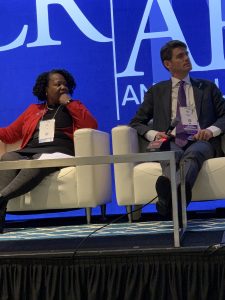ATLANTA—Your voice matters: That was the shared theme of presentations by Angus Worthing, MD, FACR, FACP, William F. Harvey, MD, MSc, FACR, and Georgia Rep. Kim Schofield (D-Atlanta, Dist. 60) in the session, Raise Your Voice! Advocacy Update from Government Affairs, at the 2019 ACR/ARP Annual Meeting on Monday, Nov. 11.
Dr. Worthing, a practicing rheumatologist at Arthritis & Rheumatism Associates in the Washington, D.C., area, talked about making his voice matter in the representation of rheumatology in a meeting with officials at the Department of Health and Human Services while discussing the plan announced by the Centers for Medicare & Medicaid Services (CMS) in August 2018 to permit Medicare Advantage plans to use step therapy for Part B drugs, with a look-back period of just 108 days to be exempt from step therapy.
Dr. Worthing was able to tell the officials in person that many of the drugs he prescribes are administered only every six months or annually, missing the 108-day window. That one meeting helped make a difference in the final rule, which changed the look-back period to 365 days. One voice made a difference.
Having a loud voice helps make a difference. Dr. Worthing also told attendees that Congress has a lot of pressing issues taking attention away from the issues important to rheumatologists and their patients, stressing the importance of continued advocacy to ensure important issues—such as prior authorization, step therapy, musculoskeletal (MSK) ultrasound, the rheumatology workforce shortage, research funding, drug prices, patient access to specialty drugs and infusions, and more remain at the forefront of lawmakers’ minds.
“We dream big,” said Dr. Worthing, reflecting on the fact that just 6,000 rheumatologists among more than a million U.S. doctors can have an impact on U.S. policy. Coalitions, grassroots emails, opinion pieces and other articles in newspapers, the ACR’s Capitol Hill fly-ins, membership in the American Medical Association and RheumPAC are all ways that ACR members have to amplify their voices and ensure rheumatology needs are recognized and acted on in Congress and state halls. “These take our issues up a level,” he says.
To demonstrate this, Dr. Worthing cited several wins the ACR has seen result from advocacy efforts this past year, including the reversal of evaluation and management (E/M) code cuts, MSK ultrasound reimbursement cuts dampened in Medicare and the U.S. Food & Drug Administration decision to require at least three switches in the pathway for biosimilar drug interchangeability approval.





